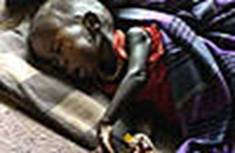Posts from — May 2010
Rwanda: Defiant suspended newspaper ‘Umuvugizi’ now published online
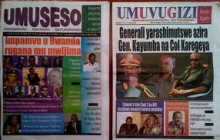 The last covers of Umuseso and Umuvugizi, before April ban.
The last covers of Umuseso and Umuvugizi, before April ban.Kigali – Mr. Jean Bosco Gasasira, the exiled editor of the suspended Rwandan newspaper UMUVUGIZI has announced that he has started publishing the tabloid on the Internet, at www.umuvugizi.com.
UMUVUGIZI and UMUSESO have been suspended in April by the High Media Council. The reasons given to force these tabloids off the streets were that they were insulting President Kagame, causing panic within the population, provoking insubordination in the army and scaring existing and potential foreign investors.
- Rwanda: Why the High Council of Media Decided to Suspend Umuseso and Umuvugizi newspapers
- Rwanda: Suspended newspaper accuses Media Council of illegal action
- Rwanda shuts down independent press ahead of presidential elections
- Rwanda: Editor Says Suspension of Paper Politically Motivated
- Rwanda: President Kagame vows to stop newspapers who sell rumours
The papers have petitioned court to reverse the six-month suspension, arguing the Media Council was acting illegally but in the meantime, the Media Council has asked the court to definitely ban them.
Mr Gasasira, the UMUVUGIZI editor, has left the country fearing for his life. He has not officially revealed his whereabouts yet. In an interview to the BBC Kinyarwanda, Mr Gasasira has confirmed that his newspaper has started publishing online, insisting that the current suspension doesn�t apply to publications he can make in exile from outside Rwanda.
- If you want to receive Rwandinfo articles in English through your RSS Reader, click here.
May 20, 2010 No Comments
Democratic Green Party of Rwanda requests again authorization to hold founding congress
The Founding President of the Democratic Green Party of Rwanda, Mr Frank Habineza, has addressed a letter to the Mayor of Gasabo District on May 18th, requesting permission to hold founding Congress.
He writes:
18th May, 2010
The Mayor of Gasabo District
Kigali, Rwanda
Dear Sir,
RE : Requesting Permission to Hold Founding Congress for Democratic Green Party of Rwanda.
We humbly request you to allow us hold the founding congress of the Democratic Green Party of Rwanda on 4th June 2010.
After several correspondences between the District of Gasabo and National Police, we requested the Ministry of Local Government to intervene in our situation, we held one meeting with them and they showed their interest in our holding a peaceful congress. We informed them of our new strategy to sign party documents in the Public Notary�s Office, without holding a congress but they clarified that a congress was mandatory.
It�s in that regard that we would like to once again request for your permission to hold the Party�s founding Congress on 4th June 2010 at CASABONITA Hall, Kimironko Sector, Gasabo District, Kigali City. We would also like to take on this opportunity to request the presence of the District Public Notary who will witness the signing ceremony.
We recently re-organized our party and nominated new committee members, we don�t have any internal problems. The Police had written to us, assuring its commitment to protect us in case we got the permission from the District, we are hopeful that we shall not have any security problem. Since it�s in Government�s roles and obligations to ensure security for all Rwandans, including ourselves, we are hopeful to have a peaceful and successful congress.
We are looking forward to getting your quick response.
Yours Faithfully
Frank HABINEZA
Founding President,
Democratic Green Party of RwandaC.C :
- Minister of Local Government
- Mayor of Kigali City
The Democratic Green Party of Rwanda has already officially announced that their leader Frank Habineza will be the party’s flag-bearer during the upcoming presidential elections.
- If you want to receive Rwandinfo articles in English through your RSS Reader, click here.
May 19, 2010 No Comments
Democratic Green Party of Rwanda presents Chair Frank Habineza as Presidential Candidate

Frank Habineza - Chair of Democratic Green Party of Rwanda
Mr Frank Habineza will be the flag bearer of the yet-to-be registered Democratic Green Party of Rwanda for the August upcoming presidential elections. The party has been announced this in a declaration signed on 17 May by the 8 members of the Green Party’s National Executive Committee.
The announcement reads as follows:
DECLARATION : INTENTIONS TO FIELD A PRESIDENTIAL CANDIDATE
After a lot of inquiries and speculation from different media houses both in Rwanda and outside Rwanda, the Executive Committee of the Democratic Green Party of Rwanda declares its intentions to field an opposition Presidential Candidate in the upcoming August 2010 elections.
Our participation in the upcoming presidential elections is on condition of the Party Registration before the end of June 2010. The Party Flag bearer will be Mr. Frank HABINEZA, the founding President of the Party.
More about Green Party
- Democratic Green Party of Rwanda committed to Non-violence
- Rwanda Green Party Leader Frank Habineza Elected President of African Greens FederationThe Democratic Green Party of Rwanda will submit once again a request to Gasabo District to allow it hold its party founding congress on 4th June 2010 and allow us participate in the World Environmental Day cerebrations, which will be held on International Level in Rwanda. We hope that once the Congress is successful, we will immediately submit our complete dossier requesting for registration to the Ministry of Local Government, which normally doesn�t delay in dealing with such matters, is expected to register the party before the deadline of submitting nominations of Presidential Candidates between 24th June – 2nd July 2010.
We hope the District will give us a quick and positive response. We recently re-organized our party and got new Executive Committee members, we don�t have any internal problem. The Police had written to us, assuring its commitment to protect us in case we got the permission from the District, we are hopeful that we shall not have any security problem. Since it�s in Government�s roles and obligations to ensure security for all Rwandans, including ourselves, we are hopeful to have a peaceful and successful congress.
We call upon the Rwandan Government to open up political space and allow opposition parties to participate in the upcoming presidential elections.
Related:
- Democratic Green Party of Rwanda is not an RPF Wing Party
- Rwanda: Is Green Party becoming an RPF satellite party?
- Greens and EU Parliament Human Rights Chair Demand Protection of Rwandan Opposition Politicians
- If you want to receive Rwandinfo articles in English through your RSS Reader, click here.
May 19, 2010 1 Comment
Rwanda: UN Deputy Secretary-General Asha-Rose Migiro addresses the International Forum on Role of Leadership in Promoting Gender Equality

UN Deputy Secretary-General - Asha-Rose Migiro
Kigali – Following are UN Deputy Secretary-General Asha-Rose Migiro�s remarks to the International Forum on the Role of Leadership in Promoting Gender Equality in Kigali, 17 May:
I am honoured to take part in this important and timely forum.
I salute you, Mr. President, and the leadership of Rwanda for bringing gender equality to the centre of political, economic and social processes.
Your achievements show the remarkable progress that can be made with clear vision and dedication, in a relatively short period of time.
But your story also reveals an impressive demonstration of women�s resilience, courage and extraordinary ability to rebuild a country devastated by conflict and genocide. �You have made tremendous progress in advancing the role of women in the political life of the country and in legislative reform.
And you have clearly demonstrated to the world that achieving the highest global representation of women in parliament is possible despite past and present challenges.� The lesson drawn from your experience is simple:� we must keep going in spite of the trials we may encounter in our journey to gender equality and the full empowerment of women.
Asha-Rose Migiro
UN Deputy Secretary General
Gender equality is a key goal in itself.� But it is more than that.� Women�s empowerment is an essential means to achieving sustainable development, economic growth, and peace and security.� We must spread this message and translate it into concrete action at all levels.
Now is the time.� 2010 is an important year for gender equality.� This year marked the fifteenth anniversary of the adoption of the Beijing Declaration and Platform for Action, which remains at the heart of the international normative and policy framework on gender equality.
In September, a high-level event of the General Assembly will assess progress in meeting the Millennium Development Goals and to forge a concrete action plan for achieving them by the agreed target year of 2015.
In October, we will mark the tenth anniversary of the ground-breaking Security Council resolution 1325 (2000) on women, peace and security, and reaffirm that sustainable peace is possible, only with women�s full participation.
These milestones, including this Forum, provide excellent opportunities to assess how well countries, regions and international organizations have done in the promotion of gender equality � and to identify strategies and partnerships that can accelerate progress.
We have much to build on.� Across the globe, there are now institutional mechanisms on gender equality, as well as gender studies programmes.� The mainstreaming strategy has emerged as a key tool for systematically bringing gender perspectives into all policy and programming processes.
Globally, the number of women in paid employment has increased, and women�s participation in the labour force has reached a new high.� Over the past decade, States have devoted greater attention and focus to overcoming occupational segregation and addressing the unequal distribution of unpaid domestic and care work.
Governments have introduced a variety of measures in support of women�s equal access to and control over economic resources, including credit and land rights.� Access to education has increased for girls at all levels, particularly in primary education.
Increasingly, States are establishing comprehensive legal, policy, and institutional frameworks to end violence against women and girls, and support services are increasingly available to survivors.
During the past decade, a better understanding has been gained on women’s participation in peace processes, the elimination of sexual violence in armed conflict, and ensuring the consideration of gender perspectives in the context of armed conflict, peacebuilding and reconstruction.
More and more leaders from all walks of life � women and men � are taking a public stance on ending violence against women, including sexual violence, trafficking and female genital mutilation.
And there is a growing recognition among Governments and in the private sector that investing in women and girls has a powerful multiplier effect � on productivity, efficiency and economic growth.
So there are many good practices from which to learn.� The challenge ahead is to expand and apply such practices more systematically, particularly in areas where more needs to be done.
The costs of inequality � for women and girls, for their communities, for economies at large � are too high.� To cite just one example, the United Nations Economic and Social Commission for Asia and the Pacific estimates that that region is losing as much as $47 billion of output each year from a lack of female participation in labour markets.
The global economic and financial crisis has generated a new sense of urgency for committed and accelerated action to address gender-based discrimination, violations of women�s human rights and violence against women.� This requires leadership � leadership at every level and in many forms.
It means greater participation by women in political decision-making, and in corporate boardrooms.� It means transparent and fair selection and promotion processes within political parties and other political and economic bodies.� But it also means implementing effective mitigating measures to respond to structural imbalances affecting women in society.
Numerous studies have found that companies with a more balanced representation of women and men in their top management teams considerably outperform those where such representation is low.
Quotas and other temporary special measures have been applied in electoral systems and in corporate and civil service recruitment processes.� They have played a significant role in increasing the number of women in public life � which, in turn, has provided an incentive and model for younger women.
Much of this progress would not have been possible without the determined leadership of women�s groups and networks at global, regional and national levels.� Indeed, women�s organizations play a key role in holding Governments accountable.
Leadership also requires partnerships, and action by individuals � women and men alike. �After all, the promotion of gender equality is not solely a women�s issue. �Men at all levels, particularly in leadership positions, have a special responsibility.� All people stand to benefit.� So all leaders � male and female � must do their part to keep these issues at the top of the international agenda.
This is why, back at the United Nations, Secretary-General Ban and I are working closely with Member States to advance the intergovernmental negotiation process for the establishment of a new gender entity. �The new entity will strengthen the capacity of the United Nations to support Member States� own efforts to achieve gender equality, in line with their national priorities and with nationally-agreed norms and policies.
I thank all of you for everything you are doing to advance these objectives.� The Secretary-General and I stand by your side in the pursuit of our noble cause.� Thank you for your leadership, creativity and support.
As we march forth from Kigali, you have my best wishes, and my commitment as we work together to expand opportunities for women and communities everywhere.
I commend once again the Rwandese Government for their leadership in convening this conference and I look forward to fruitful deliberations.
- If you want to receive Rwandinfo articles in English through your RSS Reader, click here.
May 19, 2010 1 Comment
Rwanda hosts the International Conference on Gender Equality and Women�s Empowerment
Kigali � Rwanda has just hosted a two day (17-18 May) International Conference on the �Role of Leadership in Promoting Gender Equality and Women�s Empowerment.
The opening ceremony was attended by many dignitaries, including:
- Dr. Asha-Rose Migiro, Deputy Secretary General of the United Nations;
- Susan D. Page, the United States Deputy Secretary of State, African Affairs;
- Diana Ofwona, the regional Programme Director, UNIFEM Central Africa;and
- Fatou Bensouda, the deputy Prosecutor General for the International Criminal Court (ICC).
While opening the conference, President Paul Kagame has praised Rwandan women for their role in the development of the country, adding that empowering women and ensuring gender equality were yardsticks for development.
�Empowering women and ensuring gender equality ultimately enriches communities and entire nations. Both historically, during our liberation struggle and even more recently, in reconstructing our country, women have contributed greatly and have been at the forefront of political, economic and reconciliation initiatives,� Kagame said.
He challenged world leaders to exploit the potential of the youth as a means towards new and innovative ways to sustain and accelerate progress towards gender equality and women�s empowerment around the world.
�I want to challenge us all – as leaders and people of influence – to find new and innovative ways to sustain and accelerate progress towards gender equality and women�s empowerment around the world. In doing this, we should harness the potential of our young people, who are not constrained by gender biases, of new technologies for social education and of partnerships across governments, civil society and the private sector,� he said.
Kagame also asked the leaders to recognize the efforts of hardworking women who, most of the time, have to go through challenges to record any achievements.
�We should also recognize and appreciate the hardworking women who juggle many important responsibilities, at the same time in many cases, as professionals, entrepreneurs, wives, mothers and much more, often in challenging circumstances,� he said
Kagame urged the conference participants to refrain from dwelling on a few victories in the area of gender equality and women empowerment.
�The struggle to achieve gender equality does not cease when we experience a few victories. On the contrary, the stakes are raised even higher and we as leaders are challenged to keep on running, to run even faster, and think ahead of our times,� he said
Kagame also emphasized the importance of accountability among leaders and their constituencies.
�Another point I would like to make relates to accountability. Leadership and accountability are two sides of the same coin � one cannot exist without the other. Leaders must be held accountable by their peers and constituencies, but must also ensure accountability among those that they lead,� he said
Rwanda: UN Deputy Secretary-General Asha-Rose Migiro addresses the International Forum on Role of Leadership in Promoting Gender Equality
The Deputy Secretary General of the United Nations, Dr. Asha-Rose Migiro, took the opportunity to congratulate the President upon Rwanda�s achievements in the field of gender equality.
Kagame was later hosted to a dinner by the Women leaders, where he received the Lifetime Leadership Award for development and equality.
- If you want to receive Rwandinfo articles in English through your RSS Reader, click here.
May 19, 2010 No Comments
Rwanda: Four mountain gorillas die
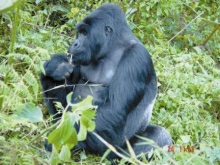
One mother gorilla and three infants are reported to have died because of extreme weather conditions, the Rwanda Development Board has announced.
The dead mountain gorillas were discovered during routine monitoring by the RDB trackers between May 16th and 17th 2010.
The dead gorillas have been identified as Intwali and her 1.5 year old baby- Mutesi (named last year), a baby belonging to Mahane and Imvune�s two-week old baby discovered Monday morning.
Efforts by veterinary doctors to save the babies were futile.
Though the doctors are now conducting a necropsy, it is suspected that the cause of death is attributed to the extreme cold in the last few days.
The dead gorillas belonged to Pablo and Ugenda group which are settled in the Karisimbi area and is currently extremely very cold and at high altitude.
�While it is not unusual to witness death of infant gorillas during the first three months, the sudden death of all the four, is not only very shocking, but also is such a great loss to Rwanda and the entire conservation team,� said Rica Rwigamba, the RDB Head of Tourism and Conservation said.
�Every gorilla death is a major setback to conservation efforts to remove the mountain gorillas off the critically endangered species list�.
However, she confirmed that tourism activities have not been affected, since the deaths recorded were in a research group – that are only reserved for research purposes and are closely monitored by researchers.
Rwigamba also noted that the final preparations of the Kwita Izina, the gorilla naming ceremony, are proceeding well
Of an approximately 380-400 gorillas living in the Virunga massif ranging between Rwanda, DRC and Uganda, Rwanda is home to at least 265 which are regularly monitored.
[Orinfor - id=535]
- If you want to receive Rwandinfo articles in English through your RSS Reader, click here.
May 19, 2010 1 Comment
SOS for Rwandan Refugees in Uganda
Over 1,000,000 Rwandan refugees face forced repatriation from Uganda
Mbarara: Over one million Rwandan refugees face forced repatriation as the government of Uganda said Saturday that it will not grant asylum to Rwandans living in the country, following discussions between Rwanda, UNHCR and Ugandan officials.
The development was communicated at a meeting between Ugandan officials led by Relief and Disaster Preparedness Minister, Professor Tarsis Kabwegyere and his Rwandan counterpart General Marcel, in Mbarara, Western Uganda.
In a joint communiqu�, the Rwandans in Uganda, who had fled Rwanda due to population pressure and political reasons in recent years, are over 1 million in number. Most of them have mainly settled in Kiboga and Masindi regions of central and western Ugandan respectively.
Kabwegyere�s team complained to the Rwandan delegation that the Rwandans were involved in grabbing land from Ugandans and also trying to dominate the indigenous people politically and socially.
The Rwandan refugee crisis in Uganda has over the last decade taken on political and military dimensions. The Rwandan government has accused some of them of being insurgents while the Ugandan government considers some of them as spies.
Uganda�s High Commissioner to Rwanda Richard Kabonero said that conditions in Rwanda are good for everyone to return.
He cited a group of refugees, commonly referred to as the Kibati group, saying they returned to Rwanda in October 2007 and settled happily. Those still in Uganda, Kabonero said, should voluntarily go back or risk losing their refugee status.
Over 1,312 Rwandan refugees fled to Uganda between April and March this year, claiming political persecution. The refugees, most of whom hail from the Eastern Province, were however denied refugee status.
[ARI-RNA]
Related:
Rwandan refugees refuse to leave Uganda
- If you want to receive Rwandinfo articles in English through your RSS Reader, click here.
May 18, 2010 No Comments
President Kagame sets criteria to be Rwandan: check your identity!
On the 16th anniversary of genocide in Rwanda the President of Rwanda declared in his speech to the people who attended the ceremony that �Rwandans are as free, happy, proud of themselves, as they have never been in their lives.� The same view is held but expressed in different words by foreigners who support the regime.
If that is the criteria by which Paul Kagame defines Rwandans then many people who call themselves Rwandans need to have a rethink on their identity. �It is quite clear many will found themselves excluded or feel denied their Rwandan identity. One can believe that the 60% of Rwandans live under poverty line would declare themselves to be free, as happy and proud as ever.
Who could be those happy and proud Rwandans?
President Kagame would be the ideal Rwandan that fitted his description.
Rising from the humble beginning of a refugee, an average secondary school leaver to military intelligence officer, to replacing a charismatic and popular military genius General Fred Rwigema to be Head of State and fly in the high tech plane here below, there are all reasons why Paul Kagame would feel, �happy and proud as ever� and �as free as ever �to call any decent person who challenges his views �political hooligan� or �human waste�.
Here is one of a pair of jets that President Kagame is alleged to possess.

TOP OF THE RANGE: One of a pair of ultra-luxury jets owned by the Rwandan government at Lanseria airport Picture: Sean Mowatt
The pair of Bombardier Global Express BD-700 jets – with a new price tag of $50-million each – was acquired in 2003 and 2008, respectively. Both are available for charter when not needed by the Rwandan government.
Aviation experts say the XRS is capable of flying “halfway around the world without refueling”. It is one of the biggest business-class jets available.
Other people that would meet his criteria are fellow Rwandans who doubled their income since 1996. According to UNDP: The average income of the top 20% of the population has almost doubled since 1996, while the income of the bottom 20% has remained stagnant in the past 10 years.
According to the World Bank, before the genocide in 1994, 39% of national income went to the 20% (predominantly Hutu) richest and 10% to the 20% (predominantly Hutu) poorest. At present, 51% of national income goes to the (now predominantly Tutsi) 20% richest and just 5% to 20 % (still predominantly Hutu] poorest: http://info.worldbank.org/etools/docs/library/111328/Case%20Studies.pdf
The biggest group of these happy Rwandans is said to be composed of people from refugee camps in Uganda, speaking English and are wise enough not to question the views of the great Leader. This sin cost people like General Kayumba Nyamwasa, Colonel Karegeya, General Muhire and Karake Karenzi losing their seat from the banquet table and being labelled human waste.
What about those Rwandans who feel excluded by Kagame�s criteria!
It is my very considered view that the following categories of people have no reason to feel �as free, happy and proud as ever�.
These include:
-
The survivors of genocide.
-
The people living in rural areas (80% of the population).
- though the Rwandan economy depends mainly on agriculture, which supports 80% of the workforce and produces 42% of the GDP, the agricultural sector receives a mere 3% of the national budget, a far cry from the 10% threshold recommended by the United Nations Food and Agriculture Organization (FAO)
- In 2003, the agricultural sector sustaining the majority of the poor received only 2% of total bank credits, of which 8% amounted to less than US$ 25
- In rural areas, 30% of children drop out of school before the end of 4th grade, likewise, high school enrolment stands at a 7.9% in rural areas, compared with 10% nationwide
- Military and security forces � same as with the FARG (fund for the survivors of genocide) – receive 10% of development funding, almost twice the share for agriculture, UNDP (2008),
- 83% of the medical personnel work in cities and only 17% in the poor, rural areas.
- All the rural feeder roads are now nonexistent or inaccessible due to lack of maintenance so the sick are taken to hospital carried shoulder high on improvised stretchers.
- Rwanda�s Gini coefficient, measuring economic inequality, has almost doubled in the last 20 years, placing Rwanda among the top 15% most unequal countries in the world
- Young people in concentration camp at Iwawa Island and their relatives.
- People detained without charge or charged but living in inhumane conditions and their relatives.
-
Relatives and friends of the thousands massacred in the DRC
-
Those he called hooligans and human waste as well as their supporters
-
People who cherish the installation of a republican form of government and the end of the exploitative monarchical system.
-
Refugees
-
The workers
-
Mothers
-
Returnees from Congo and Burundi
It is very hard to imagine that survivors are better off today than they were before they lost their loved ones in 1994. The President acknowledged that the survivors� funds are misused and the evidence is that the top leadership has been arrested for the mismanagement of their funds. Therefore even the help allotted to them does not reach them.
Furthermore the improvised introduction of English language has hit them hard because they speak French and hence are unable to compete for the best jobs on the job market or to get tutors to teach English to their children.
The spirits of those who would have survived if the RPF did not oppose the UN intervention in April 1994 must be turning in their graves with anger.
According to Human Rights Watch, �when the Security Council discussed sending a larger peacekeeping force to Rwanda with a broader mandate to protect civilians, the RPF feared that the force might interfere with its goal of military victory. Its leaders were particularly concerned that the French might use the force to protect the interim government. Instead of welcoming the move and urging speedy implementation, the RPF spokesman in Brussels opposed it and asserted that there were no more Tutsi to be saved�. On April 30, Gerald Gahima and Claude Dusaidi of the RPF political bureau reiterated this position.
According to Human Rights Watch �some 30,000 people were gathered at various sites in Kigali and that more than 20,000 clung to life at Kabgayi with another 10,000 at Nyarushishi…. thousands more still remained in hiding in Butare prefecture, where the killing had become widespread only ten days before�. http://www.hrw.org/reports/1999/rwanda/#P798_250014
RPF had earlier sabotaged a meeting organised by the UN representative Jacques Bobooh between the RPF and government Forces on the 15th of April 1994, to agree on a ceasefire so that the army could take on the work of stopping massacres. RPF gave impossible preconditions including the demand to denounce the civilian interim government and the President.
Many survivors say in private that they know that they were sacrificed by Kagame by deliberately shooting the plane of President Habyarimana and triggering genocide. Both the UN and OAU report concluded that the shooting of the presidential plane of Habyarimana was the trigger to genocide.
When President Kagame was pressed by a British journalist Stephen Sackur over Habyarimana assassination in the following terms: �But you didn�t have a right to shoot down his plane and to assassinate him�. Paul Kagame answered: �Well I had a right to fight for my rights!� The editor of New Times wrote later in an editorial that Habyarimana was a military target.
According to UNDP Human Development Index Report which is jointly published with government as a blueprint �turning vision 2020 vision into reality� observes that �Rwanda�s high growth rates are deceptive in that they hide large and growing inequalities between social classes, geographic regions and gender�.
�Nearly 900 beggars, homeless people and suspected petty thieves, including dozens of children, have recently been rounded up from the nation�s neatly swept streets and sent � without trial or a court appearance � to this little-known outpost�
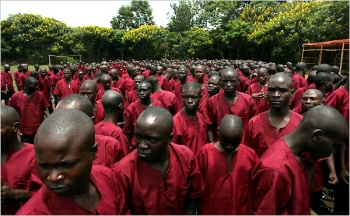
Rwandan teenagers detained in remote Iwawa Island prison camp
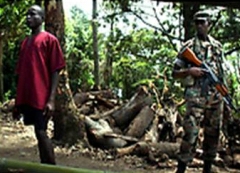
Teenager detained on Iwawa prison camp
�A few months ago, Gasigwa Gakunzi was hanging around a ramshackle house where poor children pay to watch television when the Rwandan police arrested him for loitering. The next thing he knew, he said, he was taken away from his family and carted off to this remote island in the middle of Lake Kivu�. Jeffrey Gettleman
Capital Kigali is now the cleanest city in Africa. Foreign visitors can enjoy their lives without being morally disturbed by the poverty they see around. �You do not see the beggars in Kigali like in other Africa countries� said one tourist. Kigali is environmental friendly: the fountains have running water and public garden kept green even though there is shortage of water for an ordinary resident.
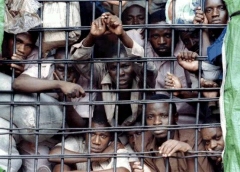
Typical prison in Rwanda
Gitarama has the most overcrowded prison in the world housing over 6000 prisoners in a building design for only 500 people. The jail is so congested that inmates have no option but to stand all day and all night and many suffer from rotting feet. The floor is moist and gangrene slowly sets on inmates toes, they turn black and fall off later. http://www.kevinandnan.com/kevin/africa.html
The standard width of a prisoner�s living space in Rwandan prisons is 40 centimetres.��The prisoners call this their �ch�teau�, their castle.��Many prisoners sleep outside, exposed to the sun and the rain.��Family visits last just three minutes.
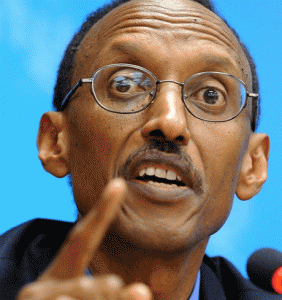
Paul Kagame: ... We shot them!
Those who preferred repatriation were safely brought into the country, but those who chose otherwise were shot �That�s what we did�.
He is not speaking about 10 or 20 people but an estimated 200,000 Hutu refugees who included women, babies and young people.
The Rwandan culture demands some respect for the dead and even fear for their spirits. Not in the Rwanda of Paul Kagame.
In his speech President Kagame called opposition leaders �hooligans� and useless.
It is an open secret that people of Rwanda live in total fear and if they were given freedom to choose the person they want they would surely vote for those who have alternative programmes to RPF. The evidence is that the regime is panicking about letting them disseminate their ideas and stand against him an election. This is a sizeable number of people who would not claim to be free, happy and proud as ever in their lives.
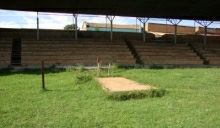
Grave Dominique Mbonyumutwa at 'Democracy Stadium', Gitarama. Opposition Leader Victoire Ingabire paid him respect at her return from exile in Jan 2010
The spot in the middle of this photo shows the grave of Mr Dominique Mbonyumutwa, first President of Rwanda, a Hutu. �Mr. Mbonyumutwa was buried in this�small public pavilion in Gitarama known in Rwandan history as �Democracy Stadium� at the specific place where, on January 28, 1961, monarchy was abolished and Rwanda was declared a Republic.
The grave was dug early this month at night by prisoners and dumped in a cemetery around Gitarama.
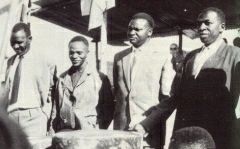
Pionniers of Democracy in Rwanda on the day of Proclamation of the Republic of Rwanda
(From L to R): Kayuku, Kayibanda, Mbonyumutwa and Bicamumpaka on the day of Proclamation of the Republic of Rwanda on January 28, 1961.
Whether Kagame likes or not, these figures are seen as heroes by many Hutu and Mbonyummutwa symbolises the end of an exploitative and oppressive system. It is politically unwise for any serious politicians claiming to bring about national unity to dismiss these heroes as useless let alone desecrate their graves and declare that they would be as happy as they have ever been.
Many Rwandans are still in exile including many prominent Rwandans such as the former King of Rwanda, Kigeri Ndahindurwa, two former Prime Ministers, three former Ministers of Foreign Affairs and Ministers of Defence and of Justice, many military officers of all ranks from a private soldier to generals and thousands of Rwandans from all sections of the social order, Hutu and Tutsi alike.� They cannot live in Rwanda for fear of their dear lives.
Rwandan workers celebrated the Labour Day with anger last May 1st, 2009. Despite the opposition of all Rwandan trade-unions, the RPF government�s gift to Rwandan workers was a Draft Labour Bill that aims at facilitating workers lay off and to extend working hours from 40 to 45.� The law was passed in July 2009.
Despite the fact that women are the majority in Parliament maternity leave has been reduced from 12 weeks to six weeks. A mother will be entitled to six weeks of leave earning 100 per cent of her salary, and if she feels the need to continue the leave for six more weeks, she will be paid only 20 per cent of her salary. Given the poverty prevailing in Rwanda, who will be able to stay home, buy food, pay bills while being paid 20% of her salary?
Besides the law gives a mother one hour a day for breastfeeding. Given the meagre salaries and the cost of transport, only mothers with private cars and able to live within the city will be able to rush home to breastfeed. Yet Rwanda is claimed as the champion of women empowerment.
Surely, the majority of women would not claim to be as happy as ever. Only those handpicked for parliamentary seats would feel very proud of their empowerment by the Beloved leader.
Tutsi returnees from Congo and Burundi are discriminated in employment due to lack of English language. Many are still leaving in refugee camps in Rwanda after being lured to come for milk and honey served by the victorious RPF. After all they have contributed money and manpower i.e. brothers, sisters, husbands, dads lost in the fighting.
Conclusion.
President Kagame has identified his group of Rwandans. If you are not as free, happy and proud as you have ever been, you are not on the list of President Kagame life commitments.� It is up to you to fight for your rights to be included in his plans and get access to national resources.
- If you want to receive Rwandinfo articles in English through your RSS Reader, click here.
May 17, 2010 7 Comments
Rwanda ruling party RPF unveils its mobile live broadcasting station ahead of presidential elections
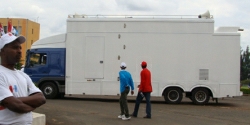
RPF Broadcasting Bus
During the extra-ordinary convention on Saturday which confirmed Paul Kagame as the RPF flag-bearer to the forthcoming August presidential elections, the ruling party Rwandan Patriotic Front has unveiled and showcased the brand new RPF mobile media center (see picture). This state-of-the-art vehicle will be intensively used for live broadcast when the RPF candidate Paul Kagame goes on the campaign trail.
- If you want to receive Rwandinfo articles in English through your RSS Reader, click here.
May 17, 2010 1 Comment
Rwandans abroad support postponement of presidential elections
The leaders of the two opposition parties PS Imberakuri and UDF Inkingi have requested that August elections be postponed in order to allow the opposition to actively take part into the elections, but have not said what they intend to do in case, as expected, the current RPF regime ignores their call. Independent observers recognize that conditions in Rwanda are not yet conducive for a free, fair, and credible election, but having experience with the RPF methods and practices, don’t have any illusion that President Paul Kagame will react positively to the call of those he calls “political hooligans”.
Echoing the two parties and probably in order to increase pressure on President Kagame, the Support Committee for UDF-INKINGI composed of politically active Rwandans living abroad, has issued the following declaration:
The Support Committee for UDF-INKINGI requests the postponement of the 2010 Presidential elections in Rwanda.
The Support Committee for UDF-Inkingi walks hand in hand with the internal opposition to claim for the postponement of presidential elections scheduled for August 2010. It is convinced that organizing elections without the participation of the opposition political parties would simply suffer from credibility and legitimacy in as much as the regime is missing an opportunity to measure its real audience within the population by shying away meaningful competition.
So far, indeed, because of administrative hindrances and barricades present at every level of civil administration, UDF-Inkingi has neither been allowed to hold the constitutional congress nor to legally register as a political party. UDF-Inkingi Chairperson, Ms. Victoire Ingabire Umuhoza, designated candidate since last September 2009 to compete for the highest office cannot therefore stand in as a presidential candidate. Much worse, she is a prey of baseless judicial inquiries and politically motivated trials.
Two other parties, namely the Green party and the PS-Imberakuri are also at a standstill. The first, in much the same way as UDF-INKINGI, could not hold its constitutional congress. The second, officially registered, is now torn up by internal divisions orchestrated by the regime in order to eject its natural leader Mr Bernard Ntaganda and outlaw his eligibility in the looming presidential elections.
The election postponement can also be accounted for in terms of the calculated delay in the promulgation of legal provisions and regulations to guarantee the political level playing field, the legality, equity and fairness of the poll. The infamous announced new electoral code bill disappeared in some government drawers. The single coloured national electoral commission is more the ruling party�s rigging body than anything national. Independent international observers in charge of ensuring elections legality and transparency are not yet visible in Rwanda.
Consequently, due to visible non-preparedness of the elections as well as to excessive obstacles set forth by the regime to thwart the opposition, the Support Committee for UDF-INKINGI urges the President of Rwanda and his government :
1. to open up the political space and allow the opposition participation
2. to enact necessary measures to level the playing ground and guarantee legal, free and fair elections
3. to postpone August 2010 presidential polls
4. To set a consensus ground with the opposition and other national or international stakeholders for the sake of the legitimacy of the poll.
For the UDF INKINGI Support Committee
Eugene Ndahayo,
President.
- If you want to receive Rwandinfo articles in English through your RSS Reader, click here.
May 17, 2010 2 Comments

